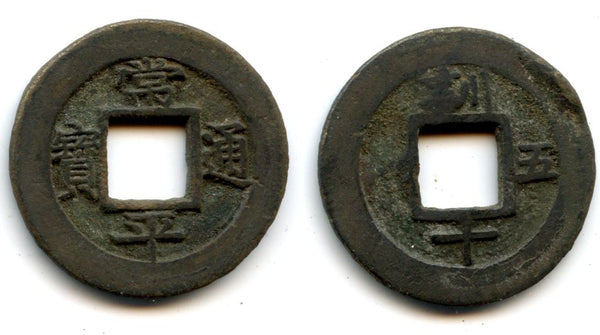
Four Chinese characters Song Pyong Tong Bo (Korean reading), inside and outside rim / Hun above the hole - Chinese characters 10 and 5 in fields, inside and outside rims. 28mm, 5.17 grams. Military Training Command issue. KM 562.15.
"Song Pyong Tong Bao" coins ("Always even universal currency") were issued between 1678 to 1880's. The mint name (usually abbreviated) was placed on the reverse, along with the denomination and the issue number (usually one to ten). Numerous reverse varieties bearing different mint marks and symbols are known. Joseon (July 13921897), was a Korean sovereign state founded by Taejo Yi Seong-gye that lasted for approximately five centuries. It was founded in the aftermath of the overthrow of the Goryeo Kingdom at what is today the city of Kaesong. Early on, Korea was retitled and the capital was relocated to modern-day Seoul and the kingdom's northernmost borders were expanded to the natural boundaries at the Amnok and Duman rivers (through the subjugation of the Jurchens). Joseon was the last royal and later imperial dynasty of Korean history. It was the longest ruling Confucian dynasty.During its reign, Joseon consolidated its absolute rule over Korea, encouraged the entrenchment of Confucian ideals and doctrines in Korean society, imported and adapted Chinese culture, and saw the height of classical Korean culture, trade, science, literature, and technology. However, the dynasty was severely weakened during the late 16th and early 17th centuries, when invasions by the neighboring Japan and Qing virtually overran the peninsula, leading to an increasingly harsh isolationist policy for which the country became known as the Hermit Kingdom.
